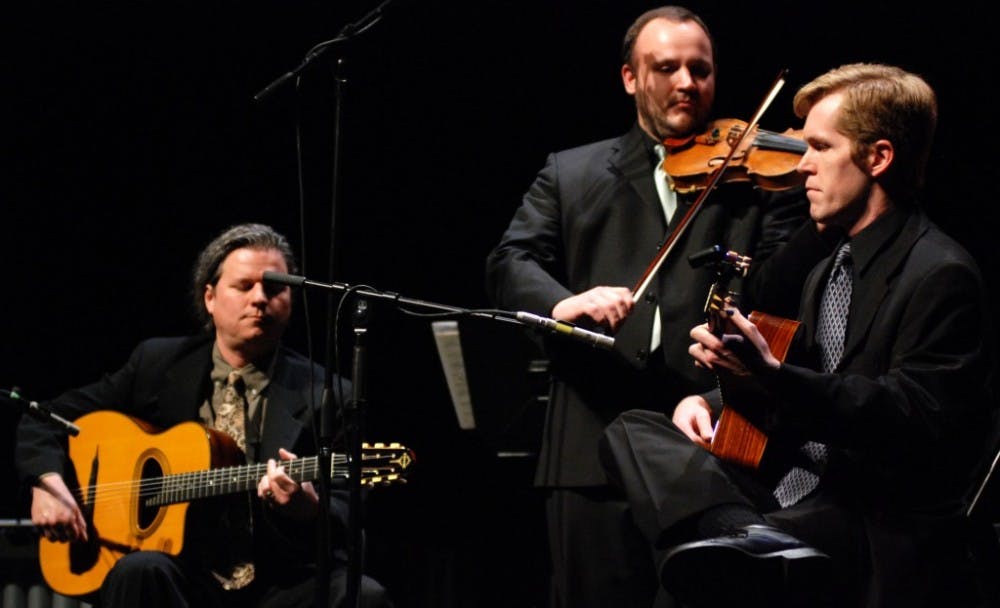The smooth, upbeat and often unique sounds of jazz could be heard streaming from the Center for the Arts most of last week. Multiple generations of jazz musicians, ranging from middle school students to world-class artists, gathered on Elon’s campus for the 16th annual Elon University Jazz Festival.
The festival was expanded this year from three to six days, beginning Feb. 13 and ending with a final concert Feb. 18. It featured guest artists like John Brown, director of the jazz program and associate professor of the practice of music at Duke University, and LeRoy Barley, lecturer and director of Jazz Combos at Duke University.
[box] Video by Sheryl Davis | Multimedia Editor [/box]
Jon Metzger, festival host and director of the Elon University Jazz Ensemble, said the festival was started and continues as a celebration of jazz, America’s original improvised music.
“It affords our Elon students, and our visiting middle and high school jazz ensembles, the opportunity to take classes, be critiqued and perform side-by-side with professional touring jazz artists,” Metzger said.
This year’s festival, which was sponsored by the jazz studies program, featured numerous workshops, lectures and performances by guest artists as well as performances by middle school and high school jazz ensembles visiting Elon for adjudication. Brown and Barley served as this year’s clinicians, who worked directly with students to critique their performances.
Also present were three musicians and lecturers from the conservatory in Graz, Austria, where Metzger said cultural exchange opportunities for Elon music students are being developed.
When selecting lecturers and performers for events throughout the festival, Metzger said he looks for several qualities.
“My main criteria is that they be outstanding performers with established track records of performing this music in the finest, best-known venues worldwide and that they also be superior teachers who are able to articulate the finer nuances of the genre to students in a positive, encouraging and productive manner,” Metzger said.
Metzger attributes the festival’s continual success to student inquisitiveness and desire to learn more about the art form, coupled with the guest clinicians’ willingness to teach the next generation of artists.
Junior Alicia Varcoe is a jazz studies minor and participated in her third Elon Jazz Festival this year. Varcoe, who provides vocals and plays piano for the Elon Jazz Ensemble, attended lectures and workshops with clinicians throughout the week and watched performances by visiting high school and middle school ensembles.
“As a musician, I have the opportunity to work with outstanding professional jazz musicians who I can learn a lot from,” Varcoe said.
Varcoe said she enjoys being surrounded by music, especially jazz.
“I learned so much in only a week from professional musicians who are making a living performing and teaching, which is what I’m studying to do,” she said.
Both Metzger and Varcoe noted the direct ties between American culture and the origins of jazz music.
“Jazz music is one of our few indigenous art forms,” Metzger said. “It has been declared a national treasure in (nonprofit music organization) House Resolution 57. In many ways, it defines our culture and who we are as Americans.”
Varcoe said most people don’t realize jazz is innately American.
“The United States utilizes jazz musicians as tools of international diplomacy, because the music is so free and creative,” Varcoe said. “Everyone can learn something from jazz music.”
According to Metzger, more than 300 middle school and high school students attended the clinics throughout the week. From a program count, he estimated about 327 people came to the final concert Feb. 18.
The Jazz Festival has something for everyone, as the presence of jazz can be found in numerous genres of music, according to Varcoe.
“Esperanza Spalding won the Grammy for Best New Artist in 2011, and she is a jazz musician,” Varcoe said. “A lot of music we listen to today is influenced by jazz riffs in pop, and music theatre music is influenced by jazz scales and harmonies. R&B vocal techniques have a lot of similarities to scat singing, and more. Music is universal.”


